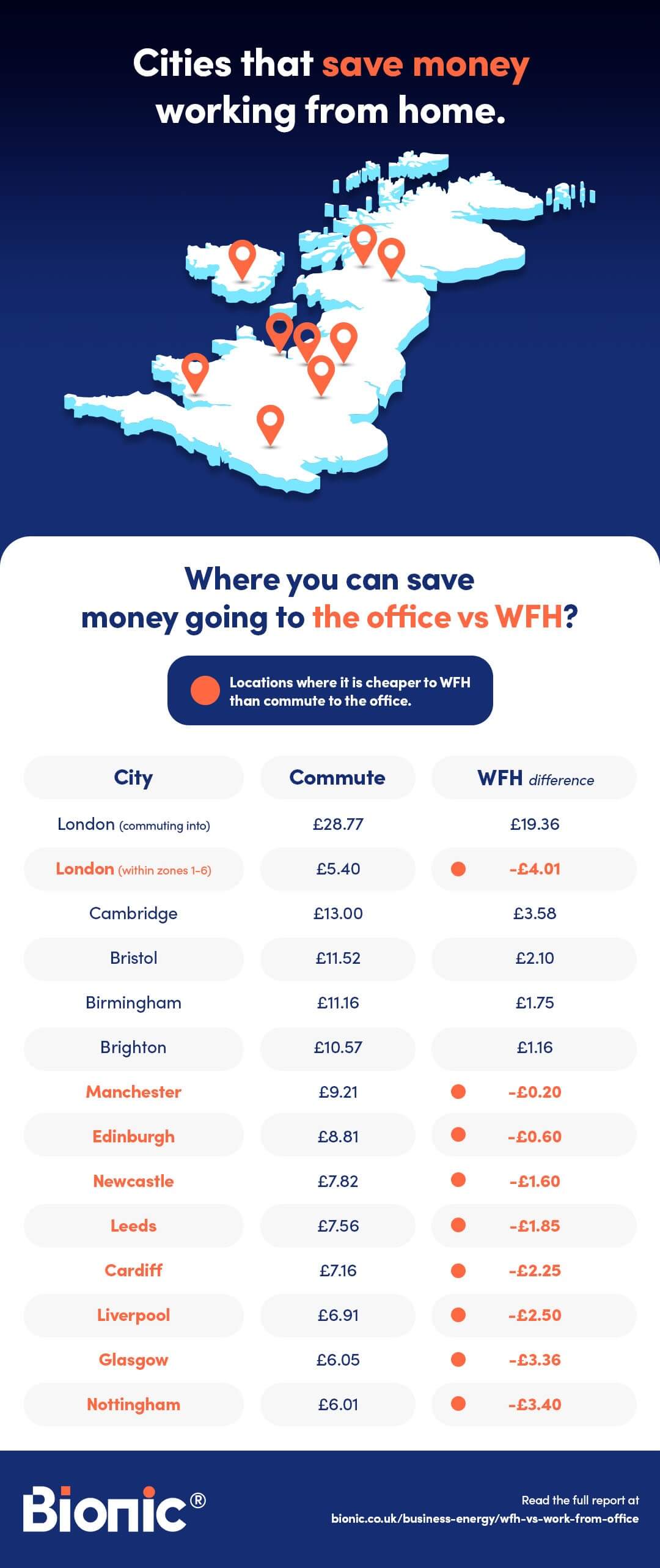WFH Energy Report - Is it cheaper to work from home or commute to the office in 2024?
As the cost of living increases in the UK, many people are looking for ways to reduce their day-to-day expenses. With the rise in opportunities for hybrid and remote working, many have started to consider their work routines as a way to keep costs low.
Hybrid working can be challenging for keeping business energy consumption low. Although commuting can be costly for employees, making use of your business’s electricity and your business’s WiFi by travelling into the office can help avoid increased bills at home.

One of the most common reasons for working from home is the perception of saving money. But we wanted to discover whether it really is cheaper than going into the office by comparing the true costs.
We have analysed every expense of working from home, such as increased usage of WiFi, electricity and energy - even down to boiling the kettle on your tea break. We have compared this with the costs of working from the office, including child care and dog sitters, to get a fair view of which is the most cost-effective option.
Key Findings:
- Working from home costs an employee on average £9.41 a day and £47.07 per week.
- The average cost of commuting into an office in the UK is £19.10 per day.
- The UK city which costs employees the most to commute to is London, where the average spend on commuting into the city is £28.77 per day based on an open return ticket.
- The UK city where it costs the least to commute into the office is Nottingham, where the average spend on commuting is £6.01 per day based on an open return ticket.
How many people work from home in the UK?
ONS data tells us that as of June 2023, working arrangements in the UK saw 10% of employees working from home all of the time, 29% working from home some of the time, 39% unable to work from home, 10% have not worked from home despite having the option to, while 12% have not worked at all. Virgin Media’s O2 Annual Movers Index found that 92% of companies had some form of mandatory in-office policy in 2023, with one of the biggest issues being the expense for workers.
How much does it cost to work from home for a day?

Working from home has many advantages, such as skipping a hectic commute and the freedom to get personal tasks done on breaks. But, it's important to be mindful that expenses can add up even when doing seemingly routine tasks like logging onto your laptop for your work day and charging your devices.
Our research has discovered that the average week working from home costs £47.07, with combined energy, water and WiFi costs. This means that on average, you can save £9.69 per day if you WFH rather than pay to commute into the office.
With approximately 252 working days a year for full-time employees (after deducting public holidays), switching from full-time working in the office to full-time remote working can save workers up to £2441.88 annually.
How much extra do we spend on WiFi when working from home?
According to Cable.co.uk, the average broadband package in the UK costs £26 a month, or £312 a year. And, a poll of 2,000 adults conducted by NordVPN revealed that the average British adult spends 47 days a year online for work purposes, out of a total of 128 days per year – meaning that more than a third (36.7%) of the average person’s internet usage is being used doing their job.
This means that Brits spend £91.68 a year on wifi costs, solely for work.
How much extra do we spend on energy bills when working from home?
When switching from working in the office to working from home, it is important to note that you can generally expect to be charged more because you’re using more energy, especially during the winter months when it can be tempting to crank the radiators up.
Beyond the essential expenses, like running your desktop computer or charging your laptop, other comforts like boiling the kettle, washing dishes used during lunch breaks, and having a TV or radio in the background can make it even more expensive!
Taking all of this into account, our data shows that running a home office can cost up to £41.28 per week.
Can you save money by hybrid working?
Hybrid working is a great option to maintain a strong work-life balance, allowing getting to know colleagues better and collaboration, plus the freedom to work from home.
The average cost for employees hybrid working in the UK for three days in an office, and two from home, is £76.12 a week. This works out to be £19.36 cheaper than if you were commuting into the office full-time (£95.48).
How much extra do we spend on water bills when working from home?
From staying hydrated to running the dishwasher for your lunchtime dishes, many daily activities can increase your water bills throughout the day when working from home. Our research found that working from home can add £3.88 a week to your water bills.
Which UK city has the longest commute to work?
Commuting isn't just costly, it can take time too. The average commute in the UK takes between 30 to 59 minutes, but which city spends the longest on their travels to work?
London is the UK city with the fastest commute
Our research found that the UK’s capital city, London, is the city where workers spend the least time commuting in the UK. The average return commute time in London is 19 minutes and the average distance is 15 miles. This is likely due to the huge transportation options available from TfL, such as the underground tube lines and frequent bus services.
Sheffield is the UK city with the longest commute
The average commute time in Sheffield is 26 minutes, the longest commute time in the UK. The average distance that commuters in Sheffield are travelling is 18 miles.
Which UK city spends the most on their commute to work?
Commuting costs are unavoidable when heading to work, and research shows that UK commuters spend an average of £19.10 a day for their round trips to and their offices.
London is the UK city with the most expensive commute
While Londoners may experience the fastest commute times, they are outspending their counterparts across the UK on daily travels to and from work. Our research found that the annual commuting cost in London can reach up to £7,131.80, which is a substantial financial burden for employees who do not have the option to remote or hybrid work.
Is it cheaper to work from home or commute?
The question that circles many of our minds: to commute, or not to commute? The answer is, that it depends on where you are located, which is why we have crunched the numbers for you.
Which is better: Working from home or the office?

The UK cities where it is cheaper to work from the office vs working from home
Our research found that those whose commute is within London Zones 1-6 with an average daily commute cost of £5.40 will find that it is cheaper to commute and work from the office than work from home. These commuters have the highest savings of all cities analysed, at £4.01 for going into the office.
It’s cheaper to go into the office than work from home in these cities: Manchester, Edinburgh, Newcastle, Leeds, Cardiff, Liverpool, Glasgow and Nottingham.
The UK cities where it is cheaper to work from home vs work in the office
Our research found that those commuting into London would see the biggest savings if able to work from home, with savings of £19.36 per working day. Their daily expenses for working from home would be just £9.41 a day.
Working from home in Cambridge, Bristol, Birmingham and Brighton is also cheaper than commuting to the office, and savings in these regions span from £3.58 to £1.16. While every saving helps, the contrast is bigger in London where commuters can save £19.36 - highlighting the high commuting expenses for Londoners.
How much are parents spending just to go to work?

The option of working from home is massively beneficial for parents, allowing them to have the flexibility to support their family's needs.
Taking into account train fares to get into the office (£19.10), childcare fees which can extend past the working day to account for commuting times (£56.50) and even parking at the train station (£12.50) if a car is required to take their child to childcare, a day in the office for a parent can cost up to a total of £88.10.
This large amount is a huge deduction from working parents' salaries, especially when working from home can cost as little as £9.41. But, even with the option of remote working often parents find it challenging to fully attend to their children's needs while juggling professional responsibilities working from home. This can mean that some parents need help with childcare when not in the office, adding to the overall increased costs associated with working and parenting.
How much dog owners spend to go to work
Daycare costs aren't just for commuting parents - dog mums and dads have to source support for their four-legged friends whilst in the office too. According to the Pet Food Manufacturers' Association, 3.2 million households acquired pets during the pandemic, making pet care considerable for many more people. Another study showed that the COVID-19 lockdowns saw many pets developing separation-related problems, further showing the need for pet care as owners return to work outside of the home.
With the average working day being eight hours, without the commute being taken into account, many pet owners will find that their dogs can’t be left home alone for this amount of time. Pet sitters and dog walkers can be costly but necessary expenses for pet owners who have to go out to work.
According to ManyPets, it costs on average £25 for your dog to spend a day at doggy daycare, a considerable expense for our furry friends to be cared for while working.
How to reduce energy consumption when working from home
Being aware of practical ways to reduce your energy consumption while working from home is an effective way to reduce your costs, as well as being environmentally conscious. Here are our top tips for optimising your home office energy usage.
- Let natural light in - Take full advantage of the hours in the day when natural light is bright enough to light the room. Open up the curtains instead of using artificial lighting throughout the day.
- Unplug chargers when not in use - Remember to unplug devices when not in use, as charges continue to draw power even after your device reaches full battery power.
- Reduce your heating - If you decide to use your heating, turn off the radiators in rooms that are not currently in use to minimise the amount of heat that you are using
- Be energy efficient when cooking lunch - When it comes to the time to make your lunch, there are a few simple adjustments that you can make to help reduce your energy consumption. For example, if cooking on the hob, put a lid on your saucepan to keep the heat in and when making a cup of tea only put as much water as you're going to use in the kettle.
- Adjust your computer settings - Being energy efficient with your computer is a simple way to keep costs down. You can shut down your computer once you have finished using it for the day and activate sleep mode throughout the day during periods of inactivity. It is also good to note that you should unplug any devices connected to your desktop when not in use, such as printers and headphones.
- Compare energy providers - An effective way to keep your energy bills as low as possible is to ensure that you are getting the best deal possible. Compare prices and see if you could be getting charged less elsewhere and if necessary, switch energy providers.
Read more about eco-friendly solutions for remote workers.
How to reduce energy consumption in the office
Reducing energy consumption in the workplace can be an effective way to cut business operating costs. Our research found that the average energy consumption for a small business in the UK is between 15,000 kWh and 25,000 kWh, so here are our tips so that you can optimise your usage.
- Install light sensors - Forgetting to switch off lights won't be a problem anymore with motion-censored lighting, as they’ll switch off automatically when the room is not in use.
- Switch off appliances at the end of the day -From the coffee machine to desktop screens, turning off appliances at the end of the day is a simple but effective way to stop energy being wasted overnight.
- Go paperless - Printers, photocopiers and shredding machines can all be costly machines to run, and with the world turning digital they can be avoided too! Instead of printing a document out for a colleague, send it in an email, and save on energy and paper.
- Use the stairs - According to industry statistics, elevators account for nearly 10-15% of a building's total energy consumption. Encouraging staff to opt for the stairs over the elevator where possible will not only help to reduce energy consumption but promote a more active way of living too.
- Hybrid working - Allowing employees to work from home some days can be beneficial for both them and the business's energy bills. Employees get to save on their commuting costs, and office owners will see a reduction in energy consumption.
Embrace the opportunities of the new remote working world
While working remotely may not suit every business and employee, embracing a hybrid work model is a practical and effective solution to keeping costs down for both parties. People enjoy the freedom and flexibility of remote working, and it proves to be very successful for parents and those with long commute times. So, it may even improve productivity and staff wellbeing.
Embrace the opportunity to reduce your office’s energy consumption through hybrid working and reduce your own energy bills. Get in touch on 0800 860 6833 to switch business energy supplier or start a quote online today to compare prices.
Methodology
We used the *data sources to analyse the cost of both working remotely and in the office across different UK regions. Our analysis covered a range of lifestyle factors, such as parenthood and pet ownership, to determine the most financially advantageous choice for workers.
*Data Sources:
ONS - Public opinions and social trends, Great Britain: working arrangements
Virgin Media’s O2 Annual Movers Index
Cable.co.uk Global broadband pricing league table 2023
NordVPN - Brits spend more than 22 years of their lives online
Pet Food Manufacturers' Association
NCBI - Changes in Dog Behaviour Associated with the COVID-19 Lockdown, Pre-Existing Separation-Related Problems and Alterations in Owner Behaviour








